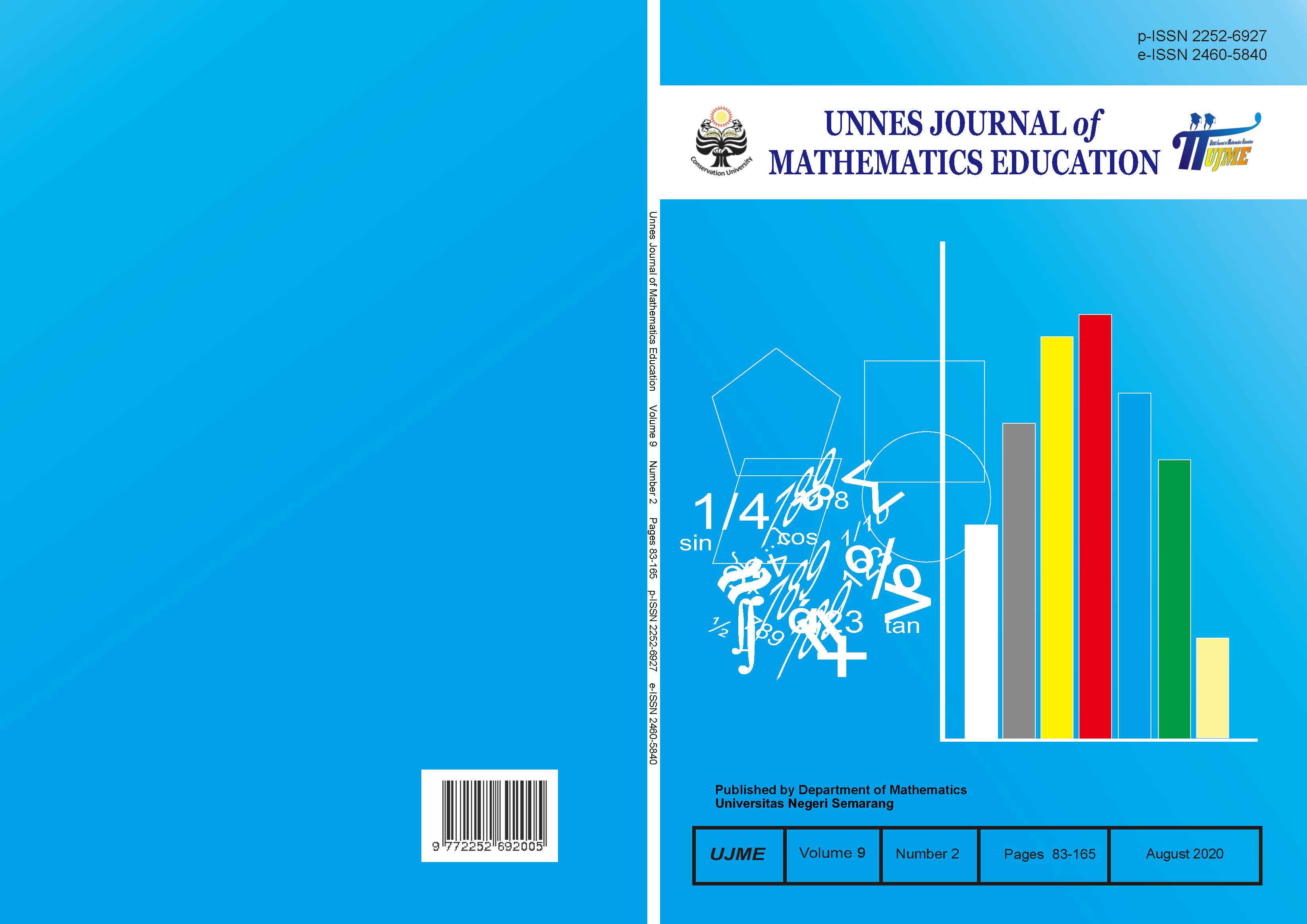Algebraic thinking ability of VIIth grade students in mathematics using SAVI learning model
##plugins.themes.academic_pro.article.main##
Abstract
Algebraic Thinking has become a research trend to be developed in secondary and elementary schools. Algebraic Thinking, according to Kieran (2004), includes generational ability, transformational ability, and global meta ability. Permendikbud No. 58 of 2014 indirectly states mathematics is being taught to hone the algebraic thinking ability. The SAVI learning model (Somatic, Auditory, Visual, Intellectual) combines physical movement, five senses, intellectual activity. The purpose of this study was to analyze the classical mastery of algebraic thinking ability of VIIth grade students, one of junior high school in Ungaran in the SAVI learning model, to analyze the algebraic thinking ability of VIIth grade students in the SAVI learning model and PBL (Problem Based Learning), to describe the algebraic thinking ability of VIIth Grade students in the SAVI learning model. The results showed that (1) Algebraic thinking ability of VIIth Grade students in SAVI learning did not achieve classical mastery; (2) The algebraic thinking ability in SAVI learning was better than in PBL; (3) Algebraic thinking ability of VIIth in SAVI learning showed that generational ability reached 47.84%; transformational ability reached 51%, and global meta ability reached 33.8%.
##plugins.themes.academic_pro.article.details##
References
Becker, J. R. & Rivera, F. D. (2007. Generalization in Algebra: The Foundation of Algebraic Thinking and Reasoning Across Grades. ZDM Mathematics Education, 2008(40): 1.
Katz, V. J. (2007). Algebra: Gateway to a Technological Future. Columbia: University of the District of Columbia.
Kieran, C. (2004). Algebraic Thinking in the Early Grades: What Is It ?. The Mathematics Educator 8(1): 139-151.
Lew, H.C. (2004). Developing Algebraic Thinking in Early Grades: Case Study of Korean Elementary School Mathematics.The Mathematics Educator 8(1) :88-106.
Mashuri, M., Wijayanti, K., Veronica, R. B., & Isnarto, I. (2018). Keberlakuan Teorema pada Beberapa Struktur Aljabar. Prosiding Seminar Nasional Matematika 1, 928-935.
Masrukan. (2014). Asesmen Otentik Pembelajaran Matematika, Mencakup Asesmen Afektif dan Karakter. Semarang : Fakultas Matematika dan Ilmu Pengetahuan (FMIPA) UNNES.
Matthews, C., Cooper, T, & Baturo, A. (2007). Creating Your Own Symbols: Beginning Algebraic Thinking with Indigenous Students. Proceedings of the 31st Conference of the International Group for the Psychology of Mathematics Education. (3): 249-256.
Meier, D. (2002). The Accelerated Learning Handbook. Bandung: Kaifa.
Radford, L. (2013). The Progressive Development of Early Embodied Algebraic Thinking. Mathematics Education Research Journal.DOI 10.1007/s13394-013-0087-2.257 : 257-277.
Rifai’, A. & Catharina, T. A. (2011). Psikologi Pendidikan. Semarang: Universitas Negeri Semarang.
Rusman, T. (2013). Statistika Penelitian, Aplikasinya dengan SPSS. Yogyakarta: Graha Ilmu.
